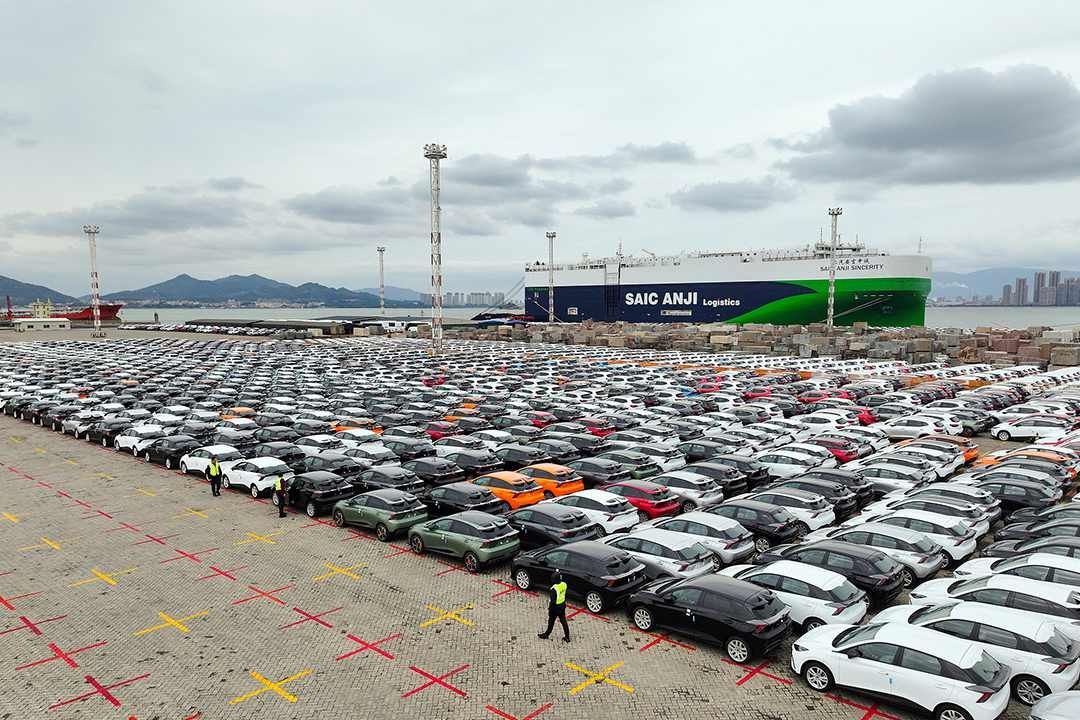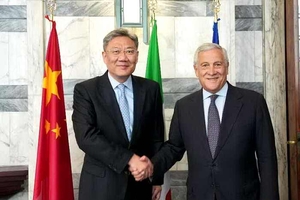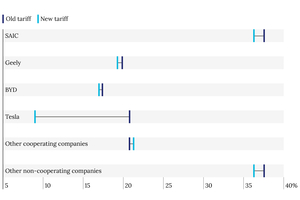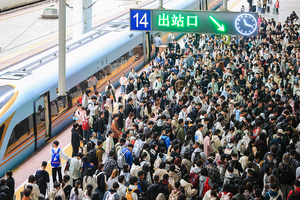EU’s Approval of EV Tariffs Condemned by Beijing, Chinese and German Carmakers
Listen to the full version

The EU’s vote to impose extra import tariffs on Chinese electric vehicles (EVs) has been met with criticism from Beijing and the boardrooms of both Chinese and German carmakers, and sparked calls for further investment from Chinese automakers in the bloc.
Localizing manufacturing would be the “optimal” way to reduce the risks posed by the protectionist trade policy, an analyst told Caixin, speaking on condition of anonymity.

Download our app to receive breaking news alerts and read the news on the go.
Get our weekly free Must-Read newsletter.
- DIGEST HUB
- The EU voted to impose extra import tariffs, up to 35.3%, on Chinese electric vehicles, leading to criticism from China and German carmakers.
- To mitigate the impact, some Chinese firms like BYD and Chery have started investing in local manufacturing facilities in Europe.
- Beijing and German automakers express concerns about potential negative consequences, urging dialogue for a trade resolution instead of tariffs.
The European Union's (EU) recent decision to impose additional import tariffs on Chinese electric vehicles (EVs) has faced backlash from both Chinese and German carmakers, as well as criticism from the Chinese government. The move has stirred debate on the need for Chinese automakers to bolster investment within the EU market to mitigate potential risks posed by these protectionist measures [para. 1][para. 2]. Experts suggest that localizing production could be an effective way for Chinese EV manufacturers to navigate the challenges posed by the EU’s trade policies [para. 2][para. 3]. Some Chinese car manufacturers have already started increasing their investment in European production facilities. Notably, BYD Co. Ltd. has initiated plans to establish a factory in Hungary, and Chery Automobile Co. Ltd. acquired a manufacturing facility in Barcelona [para. 4][para. 5].
The escalation in tariffs, endorsed by the EU following a vote among member states, involves definitive countervailing duties on imported Chinese-made battery electric vehicles (BEVs), ranging from 7.8% for Tesla Inc. models manufactured in China to 35.3% for vehicles from other companies like SAIC Motor Corp. Ltd. that did not cooperate with the EU investigation [para. 6][para. 7]. These new tariffs come on top of the existing 10% import duties for cars [para. 8]. The EU’s intent behind these tariffs, provisionally announced back in June, revolves around countering the alleged undercutting of EU car manufacturers due to substantial state subsidies received by Chinese firms [para. 9].
In response, the Chinese government and significant players in the automotive industry have voiced strong opposition. China’s commerce ministry labeled the EU's tariffs as a violation of World Trade Organization rules, arguing that they disrupt international trade, hinder cooperation, and pose challenges to environmental advancement [para. 10]. Additionally, leading automotive companies, including Geely, BMW, Mercedes-Benz, and Volkswagen, have expressed concerns that such measures could escalate trade conflicts and ultimately harm consumer and corporate interests on both sides [para. 11][para. 13]. Notably, German carmakers, wary of possible backlash from China, urged faster reconciliation to avoid escalating tensions [para. 12].
The EU maintains that it is working towards finding alternative solutions with China that comply with World Trade Organization (WTO) standards and adequately address the subsidization issues identified during their investigations [para. 14]. Tariffs are regarded as the most viable albeit uncomfortable option in addressing the EU's trade challenges with China given the existing toolkit, although alternative measures like price floors and quotas have been considered [para. 15]. Notably, a proposed initiative from a group of Chinese carmakers to avert tariff hikes by setting minimum prices for their vehicles was rejected by the European Commission [para. 16].
In advocating dialogue over confrontation, the European Union Chamber of Commerce in China has stressed the importance of bilateral negotiations to resolve trade disputes and promote fair competition [para. 17]. Emphasizing the value generated by the Europe-China relationship in the past, they suggest that there remains significant potential for creating value through balanced cooperation moving forward [para. 18].
- BYD Co. Ltd.
- BYD Co. Ltd. signed a preliminary land purchase deal in February to build its first European electric passenger car factory in Hungary. This move is part of the company's strategy to localize manufacturing in response to the EU's new import tariffs on Chinese electric vehicles.
- Chery Automobile Co. Ltd.
- Chery Automobile Co. Ltd. recently announced its acquisition of a vehicle manufacturing facility in Barcelona, as part of its strategy to increase investment in European car assembly. This move is in response to the EU’s decision to impose extra import tariffs on Chinese electric vehicles, encouraging Chinese automakers to localize manufacturing within the bloc to mitigate risks associated with protectionist trade policies.
- SAIC Motor Corp. Ltd.
- SAIC Motor Corp. Ltd. announced plans to build its first electric vehicle factory in Europe as early as July last year. The company is subject to the EU's new import tariffs on Chinese-made battery-electric vehicles, with its vehicles facing duties of up to 35.3%.
- Zhejiang Geely Holding Group Co. Ltd.
- Zhejiang Geely Holding Group Co. Ltd., which controls Sweden's Volvo, criticized the EU's decision to impose tariffs on Chinese EVs, stating it is "not constructive" and will harm EU-China economic and trade relations, impacting both European companies and consumers.
- BMW AG
- In a statement, BMW AG described the EU's decision to impose extra import tariffs on Chinese electric vehicles as a "fateful sign" for Europe's auto industry. The company urged the EU and the Chinese government to swiftly reach a reconciliation, warning that a trade conflict would benefit no one.
- Mercedes-Benz Group AG
- Mercedes-Benz Group AG criticized the EU's decision to impose extra tariffs on Chinese EVs, calling it a mistake with potentially far-reaching negative consequences. They urged the EU and China to find a mutually beneficial solution and called for delaying the tariff imposition.
- Volkswagen AG
- Volkswagen AG criticized the EU's decision to impose additional tariffs on Chinese electric vehicles, stating it was "a wrong approach" that wouldn't improve the competitiveness of the European auto industry.
- PODCAST
- MOST POPULAR







 Sign in with Google
Sign in with Google
 Sign in with Facebook
Sign in with Facebook
 Sign in with 财新
Sign in with 财新